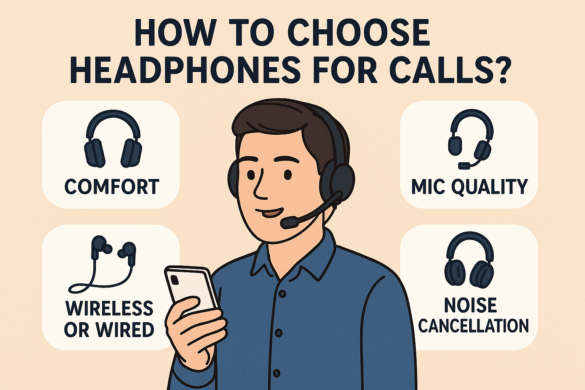How to Choose Headphones for Calls?
Choosing the right headphones for calls can be a bit like fishing in a sea of endless possibilities. With countless options available, from bulky over-ear models to svelte earbuds that look as though they’ve slipped right out of a sci-fi movie, it’s easy to feel overwhelmed. But do not fear, dear reader! Let’s embark on a journey to uncover the secrets of selecting the perfect headphones for calls, ensuring you never miss a whisper or a witty remark from the other end again.
Understanding Your Needs
Before diving headfirst into the technical aspects, let’s pause for a moment of introspection. What exactly are you looking for in your headphones? Are you a digital nomad hopping between coffee shops, needing something lightweight and portable? Or perhaps you’re working from home, seeking a model with superior noise cancellation to drown out the barking dog next door? Identifying your primary needs will help streamline your selection process.
Key Features to Consider
When it comes to choosing headphones specifically for calls, there are several essential features to consider. Let’s break them down:
- Sound Quality
The cornerstone of any headphone purchase is sound quality, and this is doubly true for calls. Clarity is paramount. Look for headphones that offer crystal-clear audio without any distortion. A balanced sound profile that doesn’t overly emphasize bass is ideal for voice calls, ensuring every word comes through with precision.
- Microphone Quality
It’s not just about hearing; it’s about being heard. A high-quality microphone, preferably with noise cancellation, will ensure your voice is transmitted clearly, free from background interruptions. Some models even offer multiple microphones to better capture your voice and reduce external noise.
- Comfort and Fit
Comfort should never be sacrificed on the altar of performance. Whether you prefer over-ear, on-ear, or in-ear models, ensure your choice fits snugly without causing discomfort during extended use. Adjustable headbands, cushioned ear pads, and various ear tip sizes can make a significant difference.
- Noise Cancellation
Particularly useful in noisy environments, noise-cancelling headphones can be a game-changer. Active noise cancellation (ANC) technology uses microphones and speakers to reduce ambient noise, allowing you to focus entirely on the conversation at hand.
- Battery Life
No one wants their headphones to die mid-conversation. Pay attention to the battery life of wireless models. Many offer quick charging features that provide hours of use from just a few minutes of charging.
- Connectivity
Bluetooth technology has advanced significantly, but it’s still worth checking the version and range. Some headphones also offer multipoint connectivity, allowing you to switch seamlessly between devices.
- Durability
Durability might not be the first thing you think of, but it’s crucial if you’re frequently on the move. Look for robust materials and solid construction that can withstand daily wear and tear.
Comparing Different Headphone Types
To assist in making an informed decision, let’s compare the different types of headphones available:
| Headphone Type | Pros | Cons |
|---|---|---|
| Over-Ear | Comfortable, great sound quality, excellent ANC | Bulky, less portable |
| On-Ear | Compact, can offer good sound quality | Can cause discomfort over long periods |
| In-Ear | Highly portable, discreet, good ANC options available | Can be uncomfortable for some users |
Personal Anecdotes and Experiences
Allow me to weave in a personal vignette. I once found myself in a bustling airport, attempting to have a critical call using a pair of subpar earbuds. The noise of announcements and chatter was overwhelming. It was then I realized the true value of a good pair of noise-cancelling headphones. Investing in a quality pair transformed my work-from-anywhere lifestyle, allowing me to conduct calls even amidst the chaos of travel.
Common Pitfalls to Avoid
In our quest for the perfect pair of headphones, it’s easy to overlook some common pitfalls. Avoid choosing style over substance; the sleekest design is worthless if the sound quality is subpar. Be wary of brand bias—renowned brands might not always offer the best model for your specific needs.
Additionally, don’t ignore the importance of trying before buying. If possible, test the headphones to ensure they’re comfortable and meet your expectations in sound and microphone quality. And above all, don’t skimp on research. Reading reviews and seeking expert opinions can save you from a regrettable purchase.
The Role of Budget
Let’s address the elephant in the room—budget. While it’s tempting to spring for the latest high-end model, there are excellent options available across various price ranges. Here’s a breakdown to guide your decision:
| Budget Range | Typical Features |
|---|---|
| Low (< $50) | Basic sound and mic quality, wired, limited ANC |
| Mid ($50-$150) | Good sound quality, some wireless options, moderate ANC |
| High ($150+) | Excellent sound and mic quality, wireless, advanced ANC, premium materials |
Final Thoughts
Choosing the right headphones for calls is a journey that involves balancing various factors, from sound quality to comfort, and yes, even a dash of style. Remember to consider your personal needs and circumstances, and don’t be afraid to invest in a pair that will serve you well in the long run. After all, clear communication is not just a luxury—it’s a necessity in our interconnected world.
In the end, finding the perfect headphones is like finding the perfect companion for your ears—one that understands your needs, complements your lifestyle, and makes every call a seamless experience. Now, with these insights in mind, go forth and find the headphones that will make your calls as smooth as a jazz saxophonist on a moonlit night.
Last Updated on August 31, 2025
